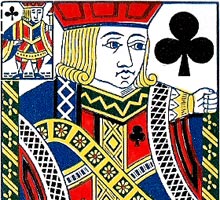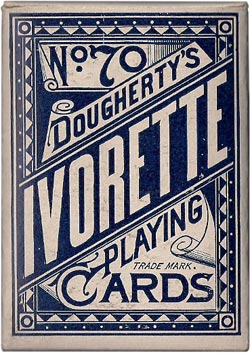Ivorette
Dougherty was at the forefront of innovation, adding Best Bowers and then Jokers, rounded corners and various types of indices, or indicators, to his cards.
A. Dougherty: “Ivorette”

Right: “Triplicates”, the miniature cards in the corners, with little breaks in the border →
Dougherty was at the forefront of innovation, adding Best Bowers and then Jokers, rounded corners and introducing various types of indices to his cards. In 1883 he was granted a patent for “Indicator” cards. Dougherty's “Ivorette No.70” deck incorporates the first use of these numbered indices, or “Indicators”, printed outside the border, along with the earlier form of “Triplicates”, the miniature cards in the corners. It also has small breaks in the borders, as in Spanish cards, and all these innovations helped players distinguish cards from only seeing the corners. It only ran for a year or less and was followed in 1894 by “Indicators No.50”. These “Indicators”, printed outside the border, soon became standard. The Ace of Spades mentions two patents, the earlier date being for the first “Triplicate” format and the second date being for the addition of the indicator number.


Above: Dougherty's “Ivorette No.70” deck has the “Indicator” Ace of Spades and a Jolly Joker. It was the last of the Triplicate series and incorporated the first use of numbered indices. The small margin breaks in the miniature playing cards differentiate the suits. It only ran for a year or less and was followed in 1894 by Indicators No.50. Image courtesy Rod Starling.
Right: click the box to zoom →
Many brands were issued featuring these new “Indicators”. The main distinguishing feature was the different box. Brands include “Ivorette”, “Tudor”, “Tandem”, “Mogul”, “Sunset” etc. Similar new ideas were being introduced or imitated simultaneously by other manufacturers both in USA and elsewhere, with various different patented brand names, such as “Squeezers”, “Dexters”, “Eureka”, etc. so that the corner indices we now take for granted were born from these competing innovations.
Regarding Dougherty's “Indicator” indices that were patented in 1883, that would have been just six years after NYCCC obtained its own patent for “Squeezers”, which are more or less the same idea. It is difficult to understand what difference there was between NYCCC's “Squeezers” and Dougherty's “Indicators” that would warrant each company being granted patent rights at about the same time.
REFERENCES
Dawson, Tom & Judy: The Hochman Encyclopedia of American Playing Cards, U.S. Games Systems Inc., 2000
All images from the collection of Rod Starling.

By Rod Starling (1936-2023)
Member since January 09, 2013
Rod Starling was one of the founding members of the 52 Plus Joker card collectors club. He authored many articles for the club's quarterly newsletter, Clear the Decks. His collection encompasses both foreign and American decks. Rod also authored a book titled The Art and Pleasures of Playing Cards.
Related Articles

Wiener Pattern – Nuremberg Version
A classic deck in a new illustrative style, with notable variations in line work, detail, and colour...

Sea-Dog playing cards
Ships’ prows, figureheads and signal flags promoting Sea-Dog Line marine hardware.

Rap Rummy
Rap Rummy made by Parker Brothers in 1926, only 4 years after the discovery of King Tutankhamen’s to...

German Travel Cards
A travel-themed educational deck helping American tourists visiting Germany.

Can You Believe Your Eyes?
“Can You Believe Your Eyes?” playing cards featuring visual illusions & other oddities.

French Revolutionary cards by Pinaut
Seven cards from a French Revolutionary pack by Pinaut featuring characters from classical antiquity...

Get Decked
Black and white cartoons devised by Sam Wagner with help from artist Lindsay Bevington.

Beowulf
Jackson Robinson's Beowulf playing card deck inspired by the Old English pagan poem.

Keith Haring playing cards
Energetic graffiti images by the American artist Keith Haring.

The Tarot of Meditation – Yeager Tarot
Marty Yeager’s original Tarot of Meditation from 1975, republished later by U.S. Games Systems, Inc....

Adobe Deck
The first digitally-produced deck of cards.

Seminole Wars deck
Seminole Wars deck by J. Y. Humphreys, Philadelphia, c.1819.

The UCR Deck
Giant-size cards designed by Thomas Sanders to advertise courses and facilities at UCR.

Fredericks & Mae playing cards
A rainbow pack from the design team of Fredericks & Mae and Benjamin English.

Red Hat Society playing cards
Society that encourages women in their quest to get the most out of life.

Mountain Dream Tarot
Groundbreaking Tarot created by Bea Nettles, using photographs and photo montage.
Most Popular
Our top articles from the past 28 days

